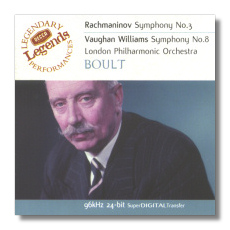
The Internet's Premier Classical Music Source
Related Links
- Latest Reviews
- More Reviews
-
By Composer
-
Collections
DVD & Blu-ray
Books
Concert Reviews
Articles/Interviews
Software
Audio
Search Amazon
Recommended Links
Site News
 CD Review
CD Review
Decca Legends

Boult Conducts
- Sergei Rachmaninoff: Symphony #3 in A minor, Op. 44 (1936)
- Ralph Vaughan Williams: Symphony #8 in D minor (1956)
London Philharmonic Orchestra/Adrian Boult
Decca Legends 468490-2 ADD 64:25
Sergei Rachmaninoff seems like an odd partner for Ralph Vaughan Williams, but with Sir Adrian Boult on the podium, the juxtaposition is less odd than one might expect. Vaughan Williams was Boult's meat and potatoes, of course, and he recorded all nine of the symphonies twice in the LP era. (His earlier recording of the Eighth Symphony is the one that is included here.) On the other hand, Boult might intuitively be thought to have little to say to the dour Russian composer, but he was a supporter of Rachmaninoff as early as 1910, and he recorded several of his works beyond the Third Symphony.
While conductors such as Ormandy and Stokowski emphasize Rachmaninoff's groaning Russian soul, Boult is far more straightforward and objective. Rubato is used very sparingly, and forward flow is not compromised for the sake of expression. The final movement isn't rushed off its feet or allowed to become hectic, as it is on other recordings. In short, if you normally avoid Rachmaninoff because you think he is too "gushy," then Boult is just the aspirin you need for that headache. A disadvantage of this recording is that Boult takes the composer's sanctioned cuts – but then again, so did the composer himself, on his recording from 1939.
Vaughan Williams had abundant respect for Boult, and also trust. In turn, Boult always worked hard to understand what Vaughan Williams was getting at in his scores. All the same, it was Sir John Barbirolli who premièred the symphony in 1956, and Barbirolli who made its first recording. Boult apparently had no hard feelings, as his performances and recording quickly followed. If Barbirolli is more impressionistic, more eager to impress in the symphony's big moments, the more cerebral Boult stays in tighter control of the material and emphasizes the tangible aspects of Vaughan Williams' music. Again, the word "objective" comes to mind. However, there's no denying that Boult also was an artist: try the end of the first movement to hear a gorgeous, painterly blending of colors.
These recordings were made in 1956. The 96kHz, 24-bit digital remastering has improved them greatly. The sound in the Rachmaninoff is a little shallow, but I think that this has more to do with the venue than with the original recording, or with this new remastering. This disc is another release in Decca's excellent "Legends" series.
Copyright © 2002, Raymond Tuttle


















